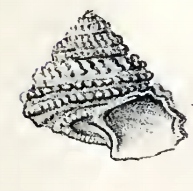This article includes a list of general references, but it lacks sufficient corresponding inline citations. (February 2023) |
Calliotropis glypta is a species of sea snail, a marine gastropod mollusk in the family Eucyclidae.[1]
| Calliotropis glypta | |
|---|---|

| |
| Drawing with an apertural view of a shell of Calliotropis glypta | |
| Scientific classification | |
| Domain: | Eukaryota |
| Kingdom: | Animalia |
| Phylum: | Mollusca |
| Class: | Gastropoda |
| Subclass: | Vetigastropoda |
| Family: | Eucyclidae |
| Genus: | Calliotropis |
| Species: | C. glypta
|
| Binomial name | |
| Calliotropis glypta (Watson, 1886)
| |
| Synonyms | |
Description edit
The size of the shell varies between 20–27 millimetres (0.79–1.06 in).
Sculpture, spirals: a flat shoulder below the suture is followed by an angulation, on and below there is a double row of smallish, round but pointed tubercles. These are remote from one another but run in pairs on the two rows. The tubercles in each row are connected by a slight rounded thread. On the second, third and fourth whorls these rows coalesce into one. On the body whorl they are slightly apart. At the periphery is a strong angulation bearing a sharp carina. Just above this is a spiral thread, which, as well as the carina, is ornamented with delicate, sharp, laterally compressed beads separated from one another by about twice their own size. Those on the upper spiral are rather the larger. The middle of the whorl for about 0.25 cm is bare. On the base there are five closely beaded threads, of which the inmost and strongest defines the umbilicus. Between the outermost and the carina is a broad slightly sunken furrow. The carina meets the outer lip and appears above the suture.
Longitudinals: The upper whorls are ribbed, but the ribbing gradually breaks into the double row of paired tubercles, and the link uniting the pairs in the two rows becomes very feeble. There are besides many distant, irregular, loose, skin-like puckerings which follow the lines of growth. They disappear on the spiral threads. The whole surface is further roughened by microscopic flexuous wrinklings.
The color of the shell is yellowish white on the thin calcareous layer overlying the nacre. The high spire is a little scalar. The apex is small and sharp. The eight whorls increase regularly in size. They are a little rounded, angulated at the carina, rather tumid on the base, and have a wide umbilicus. The suture is angulated and well defined, but a little filled up by the carina of the overlying whorl. The aperture is (apparently) perpendicular and semioval. The outer lip is well rounded. The columellar lip is a little bent over on the umbilicus, and then advancing rather straight toward the left. it is angulated and slightly toothed at the point of the base when the umbilical beaded thread joins it. The umbilicus has a wide deep funnel, with a deep spiral staircase at the junction of the whorls.[2]
Distribution edit
This marine species occurs off Queensland and New South Wales, Australia; also off Vanuatu.
References edit
- ^ Calliotropis glypta (Watson, 1879). Retrieved through: World Register of Marine Species on 18 April 2010.
- ^ Tryon (1889), Manual of Conchology XI, Academy of Natural Sciences, Philadelphia (described as Gibbula glyptus)
- Whitelegge, T. (1889). List of the Marine and Fresh-Water Invertebrate Fauna of Port Jackson and Neighbourhood. Proceedings of the Royal Society of New South Wales. 23
- Hedley, C. (1915). Studies on Australian Mollusca. Part 12. Proceedings of the Linnean Society of New South Wales. 39
- Hedley, C. (1918). A check-list of the marine fauna of New South Wales. Part I Mollusca. Journal and Proceedings of the Royal Society of New South Wales. 51 (supplement): M1-M120
- Iredale, T. & McMichael, D.F. (1962). A reference list of the marine Mollusca of New South Wales. Memoirs of the Australian Museum. 11
- Hickman, C.S. & McLean, J.H. (1990). Systematic revision and suprageneric classification of trochacean gastropods. Natural History Museum of Los Angeles County, Science Series. 35
- Jansen, P. (1994). Notes on the Australian species of Calliotropis (Gastropoda: Trochidae) with descriptions of four new species. Molluscan Research. 15
- Vilvens C. (2007) New records and new species of Calliotropis from Indo-Pacific. Novapex 8 (Hors Série 5): 1-72.
External links edit
- "Calliotropis (Calliotropis) glypta". Gastropods.com. Retrieved 15 January 2019.
- Healy, John M. (1989), "Ultrastructure of spermiogenesis in the gastropod Calliotropis glyptus Watson (Prosobranchia: Trochidae)with special reference to the embedded acrosome", Gamete Research, 24 (1): 9–19, doi:10.1002/mrd.1120240104, PMID 2591854
Media related to Calliotropis glypta at Wikimedia Commons